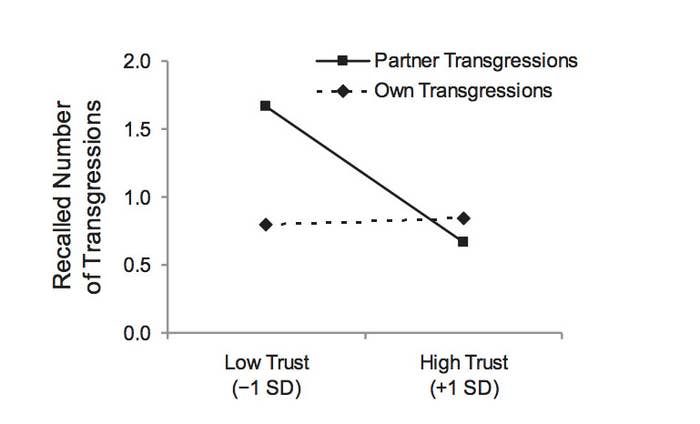
Being in love can certainly blind you to your partner's shortcomings (there's even research on this), but a new study shows love can mess with your memory too. Specifically, trusting a partner can make people forget times when that partner disappointed them — and this may be good for relationships.
Psychologist Laura B. Luchies and her coauthors gave a group of undergraduates who were in romantic relationships questionnaires to determine how much they trusted their partners. They also asked them to record all their partners' "transgressions" — anything that made them "distressed, unhappy, or irritated" — for two weeks, along with how sad, angry, or anxious those transgressions had made them feel. They asked them to record their own missteps too. When the two-week period was over, they asked the undergrads to think back and remember how many times their partner had upset them, how severe the transgressions had been, and how they'd felt at the time.
Trust appeared to give the participants artificially positive memories: Those who greatly trusted their partners remembered fewer of those partners' transgressions than those who felt less trust. They also remembered those transgressions as less severe, and remembered less sadness, anger, and anxiety associated with them. Essentially, trust made people forget some of their partners' mistakes as well as those mistakes' effect on them. Interestingly, they did not forget their own — trust had no effect on memories of one's own transgressions.
Trust and Transgressions

The authors speculate that people who don't trust their partners may have to keep a careful mental record of those partners' mistakes, as a form of self-protection. But people who do trust their partners may be able to remember the past in a rosier way, one that prioritizes protecting the relationship over the self. Forgetting the small ways someone made you mad, if you trust them overall, may help keep your relationship harmonious.
This research underscores the fact that strong relationships might include a certain amount of self-delusion. Previous research has found that relationships last longer when partners have "positive illusions" about each other — essentially believing that their partner is more desirable than he or she objectively is. The Luchies study reveals that trust can create something like a positive illusion — the ability to forget some of the things a partner has done wrong. Basically, for otherwise healthy relationships, being a little bit deluded may be a good thing.
